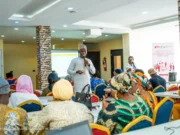The EVC Nigerian Communications Commission (NCC), Dr. Aminu Maida has called strategic collaboration with key partners, and the judiciary remains one of important stakeholders in this Nigeria.
Aminu while given his opening remarks at the 2024 edition of our Annual Workshop for Judges on Legal and Regulatory Issues in the Communications Industry explained that, “Our, NCC, mandate at the Nigerian Communications Commission, as enshrined in the National Communications Act 2003, is a wide-ranging one that includes the establishment and oversight of a regulatory framework for the Nigerian communications industry, as well as the promotion of efficient, reliable, affordable and easily accessible communications services across the country.”

According to him, “This mandate means that we play an integral role in Nigeria’s transition to a truly digital economy.

“An important aspect of this role involves facilitating the deployment and safeguarding of telecommunication infrastructure – which is essentially the backbone upon which digital services are delivered across various sectors of the economy.”
“You will agree with me that we cannot guarantee a truly digital economy without being able to adequately protect this telecommunication infrastructure that underpins the digital economy.
“I am aware, as you all are, of the extent to which the judiciary today depends on digital tools and technologies to carry out its functions. Much of the work that you do as Judges has been transformed over time by the introduction of technology, commendably improving the pace and quality of the delivery of justice in Nigeria.”
So, clearly, no sector of national life is left out of the digital transformation conversation. It impacts all of us.
“With the Presidential Order, Nigeria now has a comprehensive policy framework to protect vital telecommunication assets—from base stations and data centers to fiber optic cables.
“This framework strengthens our ability to decisively confront issues such as vandalism, illegal tampering, and preventing access to communications infrastructure, holding violators accountable to deter future offenses. “
“Under this Order, individuals, organizations, or even government agencies are prohibited from sealing, removing, or damaging telecommunications infrastructure without a lawful court order.”
“We anticipate that the courts may occasionally receive requests for orders to grant exceptions to the protections afforded to these Critical National Information Infrastructures. During this workshop, we aim to provide insights that will support judicial discretion in evaluating such requests.”
“The Office of the National Security Adviser, which plays a central role in coordinating the operationalization of the Presidential Order, has already begun stakeholder consultations and meetings to facilitate immediate implementation. It is likely that, in the near future, vandals, thieves, and others who breach this Order’s provisions will be brought before your courts. “
“We trust that with a deeper understanding of the harm and disruption caused by such actions, the judiciary will impose appropriate sanctions to serve as strong deterrents against criminal activity.”
“A functional digital economy is built on investor and consumer confidence, which are impossible in the absence of the rule of law – a critical element that is supplied by the judiciary. ”
“As the digital age advances, judicial officers must constantly adapt to ensure that the rule of law is as effective and enforceable in the online realm as it is in the world of brick and mortar.
“One key challenge lies in adapting existing legal principles to the complexities of emerging and evolving technologies.
“Nigerians are eager to see a new chapter of digital justice, where the roles played by the judiciary are effectively translated and adapted into online contexts, as follows: Protecting fundamental rights, enforcing digital contracts and resolving disputes, developing digital jurisprudence, and Promoting innovation.”
Also speaking at the Workshop for Judges on Legal and Regulatory Issues in the Communications Industry, the Chief Justice of Nigeria and Chairman, Board of Governors of the National Judicial Council (NJC), Hon. Justice Kudirat Motonmori Olatokunbo Kekere-Ekun, GCON, FNJI said the program come at a better time because there is no gainsaying the fact that, the deployment of technology in telecommunications plays a pivotal role in the advancement and enhancement of the economic system of any country and invariably stands as a driving force towards globalization.
However, according to her, “considering the fact that this Workshop primarily seeks to highlight and proffer solutions to legal issues in telecommunications, I would like to quickly bring our attention to two issues which I consider to be pivotal, and which revolve around cyber security and the attendant challenges of exploring the digital space.”
“The first is the increased risk of the personal data of consumers being misused or compromised by unscrupulous persons, thus necessitating the need for improved strategies and innovation for consumer protection in the Telecommunications Sector. Also, worth noting are deficiencies in the Banking Sector and which are attributable to reliance on digital services provided by the Telecommunications Sector. There is for instance the major challenge posed by electronically backed transactions which is commonplace in the Banking Sector. Concerns in this regard include the spate of customers whose online banking platforms have been hacked, as well as banks being compromised due to technological glitches not factored into their day-to-day operations. Consequently, these and several other challenges have resulted in a number of disputes which frequently require adjudication.”
“Ultimately, I am hopeful that this Workshop will avail Participants the opportunity to deliberate on current challenges confronting the Telecommunications Sector and to cross-fertilize ideas on the viable options and strategies to address these issues.
“It is also my expectation that the forum will equip Judicial Officers with the technical skills required for adjudicating disputes arising from the Sector and keep them abreast with global standards and best practices.
“Additionally, given the far-reaching impact of technology on every Sector and the urgency of embracing and adopting technological innovations in our various endeavors, I am confident that this engagement will offer insights into the immense benefits of digital transformation to both the Judiciary and indeed the Telecommunications Sector.
“Lastly and in conformity with the theme, I also believe the specific role of the Judiciary in expediting the said transformation will be spotlighted communicated in a concise manner.”
CJN commends the Nigerian Communications Commission, NCC, for its assiduous efforts at protecting consumers from unfair practices by service providers.










































[…] NCC’s Maida Seeks Judiciary Collaboration on Acceleration of Digital Transformation […]
[…] NCC’s Maida Seeks Judiciary Collaboration on Acceleration of Digital Transformation […]